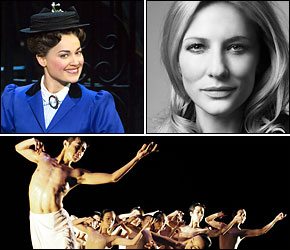
Instead of focusing on another country, the major festival at the Kennedy Center next year will focus on another landscape: the terrain(地带) inhabited by artists with various disabilities, from deafness to diabetes(糖尿病), around the world. This was a highlight of the 2009-10 season schedule, which the Kennedy Center announced at a press conference this morning.
This June festival of the Kennedy Center affiliate VSA arts (formerly Very Special Arts), celebrating the 20th anniversary of the signing of the Americans with Disabilities Act, is a centerpiece of a season that is far from splashy. Certainly it has big highlights, including the return of the Mariinsky Theater, which will bring two operas in concert and Prokofiev's sprawling "War and Peace" in March.
"War and Peace" is emblematic(象征性的, 标记的) of the season as a whole. It is hugely expensive to mount, and offers spectacle aplenty, calling for more than 200 performers. But it's not exactly a popular repertory staple. At a time of considerable hardship, it offers less escapism(逃避现实, 空想) than food for thought(引人深思的事).
The Kennedy Center hasn't cut back its artistic budget for this season, according to the center's president, Michael Kaiser, who says the $89 million price tag is in line with other seasons. But there is nonetheless a whiff of austerity(节俭), or sobriety(节制), about a program that mingles the familiar (the Mariinsky, the Bolshoi Ballet, the first Washington performances of Balanchine's "Nutcracker") with the thoughtful and challenging (a second installment of "Ballet Across America," last year's survey of small companies around the nation).
"This is a risky season," says Kaiser, pointing to the programming of the VSA arts festival instead of a big geopolitical extravaganza(豪华的演出); the presence of less-known dance companies like the Cloud Gate Dance Theater (from Taiwan) and Compañía Nacional de Danza led by the choreographer(舞蹈指导) Nacho Duato (from Spain); or a new play commissioned from Terrence McNally, "Golden Age." The latter will run concurrently(同时发生地) with two other popular McNally plays on operatic subjects, "Master Class" and "The Lisbon Traviata."
The other theatrical highlights certainly aren't feel-good, though they may be must-sees. They include "August: Osage County," the large-scale, loose-limbed, Tony-award-winning drama by Tracy Letts about several generations of a dysfunctional(不健全的) family, starring Estelle Parsons; and the Sydney Theater Company's "A Streetcar Named Desire," the production directed by Liv Ullman with Cate Blanchett as Stella. Balancing out these are the requisite comfort food: the Broadway musical versions of "Young Frankenstein" and "Mary Poppins."
The National Symphony Orchestra is offering a similar balance of the new-but-safe and the familiar. The new involves a two-program series conducted by the composer John Adams, who has become something of a go-to guy for organizations looking for new ways to present contemporary music, and whose wonderful concerto(协奏曲) "The Dharma at Big Sur," with the MacArthur winner Leila Josefowicz as soloist, is definitely one not to miss. There are a string of debuting conductors unknown to many Americans: Juraj Valcuha, Jakub Hrusa, and Alexander Vedernikov. There's a new piano concerto from the fine composer Jennifer Higdon.
As for the familiar, it comes from the orchestra's two leading conductors: Iván Fischer with Bach's Mass in B Minor as one of his five subscription programs, and Christoph Eschenbach, who will not take over as music director until 2010, with the Verdi Requiem. The orchestra's last music director, Leonard Slatkin, also returns with a program of Holst and Elgar.
This season's stand-in for the Kennedy Center's usual world cultural tour is a Focus on Russia, which offers a thematic link between different artistic genres throughout the year -- Evgeny Kissin playing at the NSO's opening night, Steven Isserlis and Kirill Gerstein offering the Rachmaninoff Cello Sonata on the Fortas Chamber Music series -- rather than a single celebration of the country.
More celebratory, perhaps, is a week-long festival called "Gospel Across America," or a rich jazz program with a Women in Jazz festival and a series called "Beyond Category," with Bill Frisell and others, a nod to Duke Ellington's dictum that some great art is "beyond category."

